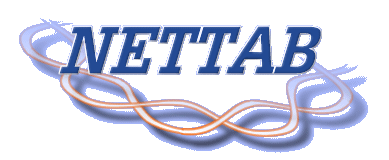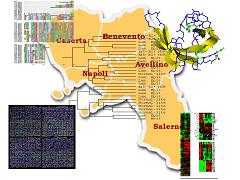
|
Joint NETTAB 2010 and BBCC 2010 workshops focused on Biological Wikis November 29 - December 1, 2010, Naples, Italy |

|
|||||||
Tutorials
Participation in tutorials is free for all workshop's registrants.
- Mining biological pathways using WikiPathways web services and more...
Thomas Kelder, Department of Bioinformatics (BiGCaT), Maastricht University, the Netherlands
Bioinformatics researcher and software developer at the Department of Bioinformatics (BiGCaT), Maastricht University.
Co-creator and developer of WikiPathways. Main research topics and interests: data analysis, visualization and integration, web technology.
In addition to various primary data formats (e.g. GPML, BioPAX, Reactome, KEGG), WikiPathways supports a variety of ways to integrate and interact with pathway content. These include directed linkouts, image maps, RSS feeds and deep web services.
We will present several code examples to show how the web service can be used by bioinformaticians (e.g. perform enrichment analysis on WikiPathways in R) and web developers (e.g. how to link to relevant pathways on WikiPathways). We will demonstrate working examples of WikiPathways integration at Wikipedia/GeneWiki, SNPLogic, Taverna, Cytoscape and NCBI, showing you how it works and how to make it work for you.
- Semantic MediaWiki: a community database and more.
Dan Bolser, College of Life Sciences, University of Dundee, Scotland, United Kingdom
Dan Bolser has a BSc. degree in biochemistry, and a bioinformatics MRes. and PhD. He is currently working on his second post doc project, and he has worked on several areas of bioinformatics, including protein structure analysis and genomics.
During his research, he has been involved in a number of rewarding open source projects. He was awarded first place in the 2nd international openfree BioWiki contest for his MediaWiki project 'MetaBase'. Subsequently he collaborated on 'PDBWiki', which was awarded second place in the 3rd BioWiki contest.
Last year he was successfully nominated for a position on the board of directors in The Bioinformatics Organization, an 'openaccess institution' that serves to develop and maintain collaborative computational resources.
Wikis are a recent development, furthering the original idea of the world wide web. At core, they support the easily and rapid creation and sharing of data, information and knowledge. Most significantly, wikis support community collaboration and the associated benefits synonymous with crowd sourcing. Wikis have been criticized, however, for their lack of structure. Information is typically provided as free text, and tables of data, when present, are not queryable. Semantic MediaWiki (SMW) address this problem, allowing users to create, develop and populate data models within the wiki.
In this tutorial, we will cover the basics of: i) data modeling, ii) data entry, and iii) querying within the wiki.
Each section will be presented both via practical demonstrations, and in terms of its theoretical foundation in semantic-web technology (RDF, OWL and SPARQL). Real world examples will be given throughout, to illustrate the current and varied uses of SMW 'in the wild'. In closing, we will touch on the 'added value' provided by integration with the semantic-web.
No prior knowledge of either MediaWiki, Semantic media wiki or the semantic web will be assumed.
- Everything you wanted to know about Wikipedia but were too afraid to ask
Alex Bateman, Wellcome Trust Sanger Institute, Hinxton, Cambridge, United Kingdom
Andrew Su, Bioinformatics and Computational Biology, Genomics Institute of the Novartis Research Foundation (GNF), San Diego, USA
In this highly interactive tutorial we will discuss best practice for interacting with Wikipedia. There are several aspects that we think you will be interested in from how to get content into Wikipedia either manually or using bots. How to get inforamtion out of Wikipedia using its API.
Because Wikipedia is also a huge online community we will also discuss aspects of social engineering and how conflict can be resolved.
Participants should come armed with questions and examples to get the most out of the tutorial.
- How to create your own collaborative publishing project with WikiGenes
Robert Hoffmann, Computational Biology Center, cBIO, Memorial Sloan-Kettering Cancer Center, MSKCC, New York, USA
Robert Hoffmann, computational biologist, studied Genetics at the University of Vienna and received his Master's degree in Bioinformatics at the Institute of Molecular Pathology (IMP). In 2001, he moved to Madrid to achieve his doctoral thesis. During his PhD he contributed to the areas of text mining in the biomedical literature (see iHOP - Information Resource for Biology and Medicine), the comparative analysis of protein networks, and the evolution and dissemination of scientific knowledge.
In 2006, he was awarded with the Society in Science Branco Weiss Fellowship, to explore novel ways of data and information management with the aim to improve the efficiency of global scientific research and also bring science closer to society. The initial part of this project was carried out at the Massachusetts Institute of Technology (MIT) at the group of Sir Tim Berners-Lee and has led to the development of the WikiGenes project.
In this tutorial, you can get a hands on experience on how to create your own private project within the WikiGenes publishing environment and how to embed it in your own website. For instance, you can invite selected colleagues to work on a collaborative article, benefiting from the authorship tracking technology in WikiGenes which links every sentence to its author and thus provides due credit to each of your collaborators. You can then make your article public and embed a live version in your website using your own layout or export it into any format.
You will also learn how to use the advanced editor of WikiGenes, manage access to your projects, stay up to date with RSS alerts, and import and export documents in different formats, including PDF and Word.
WikiGenes is open access and available online at http://www.wikigenes.org/.
Scientific Programme
Overview -
Programme
Speakers -
Tutorials
Posters
Presentations
Call for Papers
Overview -
Rationale
Topics -
Deadlines
Type of contributions
Instructions
Registration
Overview
Subscribe
Registration cost
Registration form
Useful Info
Contacts -
Location
How to find us
Deadlines -
Hotels
External links
Organization
Chairs
Scientific Committee
Organizing Committee
Institutes & Societies
Sponsors